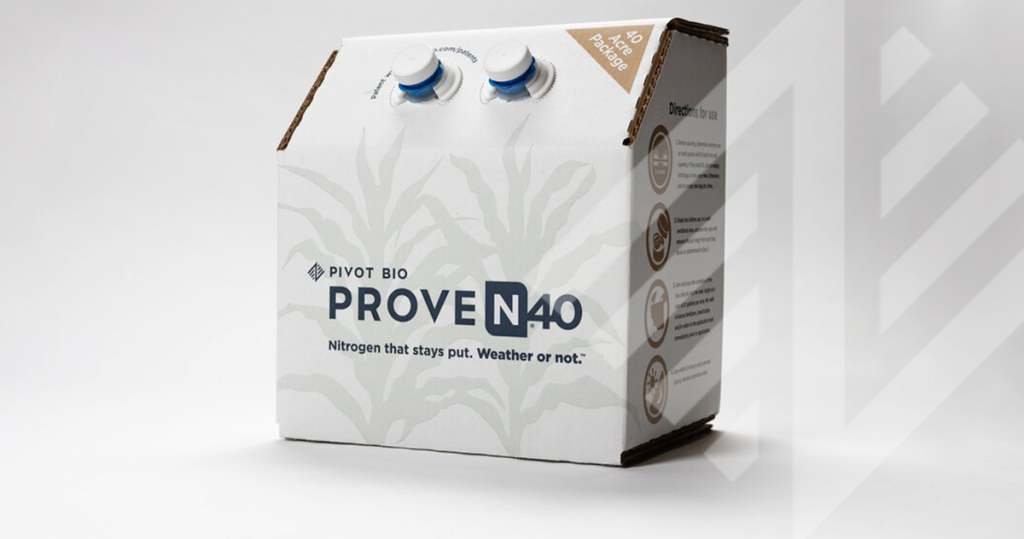UK Study Finds Higher Corn Yield with Pivot Bio Microbial Nitrogen

In the Field with Pivot Bio: Agronomists Mike Saxton and Garrett Verhagen share how PROVEN 40 enhanced yields in Kentucky.
The University of Kentucky’s College of Agriculture, Food and Environment recently participated in a trial study examining Pivot Bio’s PROVEN® 40 effectiveness in fields with cover crop rotations. We sat down with Mike Saxton and Garrett Verhagen, agronomists from Kentucky who worked with the university on the trial, to discuss the study results and how the findings can help farmers maximize nitrogen efficiency, improve soil health and enhance yields, even in drought conditions.
How does Pivot Bio’s PROVEN 40 work to replace synthetic nitrogen, and what plant health benefits does it offer?
Mike: Seventy-eight percent of the air we breathe is nitrogen. We know nitrogen is crucial to a healthy corn crop, but atmospheric nitrogen isn’t directly accessible to the plant. This is why farmers utilize synthetic nitrogen fertilizers. The problem with synthetic nitrogen is that it’s applied to the soil and requires the right amount of water to reach the plant root. Pivot Bio’s microbes help mitigate this issue by fixing nitrogen from the air and transforming it into a form the corn plant can readily utilize. The microbes do this by delivering nitrogen directly to the corn root, reducing the plant’s reliance on water for nitrogen absorption and ensuring a certain level of nitrogen uptake.
What should farmers know about the University of Kentucky’s study?
Garrett: The University of Kentucky conducted an on-farm, replicated strip trial study on corn crops planted after a small grains cover crop on a farm utilizing no-till practices. The study investigated the possibility of reducing synthetic nitrogen application by 40 pounds and substituting it with an equivalent amount of Pivot Bio’s PROVEN 40 microbial nitrogen. The findings were compelling — not only did PROVEN 40 successfully replace the 40 pounds of synthetic nitrogen, it also delivered in terms of yield.
Specifically, the study found no significant yield increase when synthetic nitrogen levels were raised from 140 to 180 pounds per acre. However, when the increase included 40 pounds of microbial nitrogen, there was a notable yield boost of 11 bushels per acre. This was despite the drought conditions we experienced in Kentucky last year. This demonstrated PROVEN 40’s efficacy in bridging the nitrogen gap that can happen only using synthetic fertilizers.
Mike, do you have anything to add to that?
Mike: Bridging the gap is exactly what PROVEN 40 does, especially when faced with extensive drought in the early parts of the season, largely because synthetic nitrogen relies on water to reach plant roots. We saw this in the University of Kentucky study but also in a northern Kentucky trial plot, where a grower applied 110 pounds of synthetic nitrogen and supplemented it with 40 pounds of PROVEN 40 across eight rows, each 750 feet long. For comparison, he applied 150 pounds of synthetic nitrogen alone in another eight rows. The outcome was striking — with the same total nitrogen applied, the PROVEN 40 combination yielded an additional 23.5 bushels per acre, a result we successfully replicated twice.
In that same trial location in late July, we experienced significant rainfall, which led to nitrogen leaching, further diminishing the effectiveness of synthetic nitrogen during both the initial drought and subsequent heavy rains. PROVEN 40 made a critical difference, delivering nitrogen straight to the plant roots and effectively mitigating the nitrogen gap under extreme weather conditions.
Can PROVEN 40 be effective for farmers who implement additional sustainability practices such as cover crops and no-till?
Garrett: Cover crop systems can leave behind a large amount of crop residue. These practices are good for soil health but can hinder nitrogen uptake due to competing crop residue. Despite these potential nitrogen challenges, the University of Kentucky trial site that utilized 40 pounds of PROVEN 40 still experienced a yield increase. This is because microbial nitrogen is delivered directly to the plant roots, bypassing the carbon-rich residue that can deplete nitrogen levels. This highlights the effectiveness of microbial nitrogen as a valuable addition to a farmer’s soil health practices, complementing their existing best management practices.
What aspects of the study stood out to you most?
Mike: The notable outcome was overcoming the usual yield penalty seen in corn following a cover crop because of the nitrogen competition with the residue. But in the University of Kentucky trial and other trial plots in the state, we saw that reducing synthetic nitrogen by 40 pounds and replacing it with 40 pounds of microbial nitrogen can offset that typical yield penalty.
Garrett: Echoing Mike, the consistent yield improvement using microbial nitrogen was consistent across nitrogen rates. When the farmer increases the nitrogen rate with synthetic alone, they cannot overcome the yield penalty that is commonly associated with cover crops.
Besides observing increased yield, what are some additional indicators of the effectiveness of microbial nitrogen?
Garrett: Yield isn’t the primary indicator of PROVEN 40’s effectiveness. The University of Kentucky study found that plants had overall greener leaves, indicating stronger nutrient uptake throughout the growing season. In a dry year like 2023, it’s more difficult for the plant to access synthetic nitrogen because it needs water to reach the root, but not so much water that it causes leaching. What we observed is that replacing 40 pounds of synthetic nitrogen with PROVEN 40 microbial nitrogen produced healthier, more established plants with larger biomass and a more robust root system, demonstrating the efficacy of microbial nitrogen beyond increased yields.
Mike: We’ve talked a lot about reducing synthetic nitrogen rates and that there’s not a one-size-fits-all approach to that. However, a key measure of PROVEN 40’s success is its ability to reduce reliance on synthetic nitrogen without compromising yield. As Garrett mentioned, we also see increased biomass. I’ve conducted multiple trials across Kentucky. In all of them, we measure stalk diameter. We consistently see stronger, more robust plants.
What steps can farmers take to determine if PROVEN 40 is right for their operations, including participating in research trials similar to the University of Kentucky study?
Mike: Farmers interested in PROVEN 40 can access and test our products in a variety of ways. The first step is to reach out to your local Pivot Bio representative and talk about setting up a trial. It’s important to consult one of our agronomists because it’s important that the demos are executed the right way.


